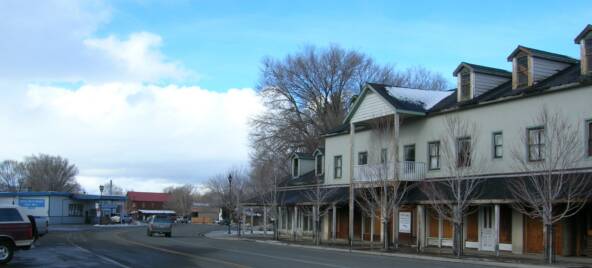At least two million California residents are public employees.
What kind of state can we look forward to when the biggest employer is the government?
The state does not produce goods and services in the context of a competitive market system.
Government is broad and inefficient.
Any funding which they rely on? That comes from the hardworking taxpayer in a private economy.
California keeps raising taxes on itself. The voters agreed to an extension of the Prop 30 tax increases. The response from small businesses and consumers? They are leaving the state. Fewer businesses, fewer taxable incomes, less revenue.
 |
| (Credit: California Political Review) |
There is simply not enough money left to shore up these overgenerous pensions.
In the last month, the shinola hit the fan.
In the city of Loyalton, California, located in the Sierra Nevada range, one hour's drive West of Reno, Nevada, four public employees got the rude, fearful awakening which public pensioners fear the most.
Their annual sum was cut ... by 60%!
Such a cut is beyond devastating!
Here's more info:
To avoid deep pension cuts, Loyalton owes CalPERS a $1.66 million lump
sum payment that cannot be made over time with installments. The city has
talked about trying to get back into CalPERS or possibly obtaining a loan.
According to a state controller’s report for 2015, Loyalton had
revenues of $1.17 million, expenditures $1.68 million, liabilities $6.16
million, assets $11.1 million, fund equity $4.8 million, and population 733.
In a “final demand letter” on Aug. 31, CalPERS gave Loyalton 30 days to
“bring its account to current.” If the city does not pay the amount owed, the
CalPERS board will be asked to declare Loyalton in default, which could trigger
the pension cuts.
Those pensions were cut. The city librarian, who had paid into the system for twenty years, got the letter last month informing that her yearly pension of $49,000 would be cut down to $19,000.
That's a huge cut.
This phenomenon is not an isolated case in California. Detroit, Michigan went bust three years ago, and the thousands of creditors (i.e. public employees) had a minute to explain to a bankruptcy judge why they should not lose their promised retirement. At the end of the conflict, however, Detroit retirees lost big money in their pension systems.
That's life, that's supply and demand, even if that outcome sucked.
 |
| Loyalton, CA (Credit: Loneliest Towns in America) |
Now, granted the city of Loyalton exited the CalPERS program, but they could not pay the large demands of the California pension system. The 2011 reforms were cosmetic at best, and even then Governor Brown has had to intervene in order to stop pension spiking and other immoral abuses of the system.
One has to start asking the California employees who agreed to this pension scheme: Did they really think that the state of California would stay true to their promises?
Its not looking good for the pensioner class. There is only so much that people are willing to tolerate from the political class, including the onerous taxes and regulations which benefit a select group of bureaucrats and elected officials at the expense of everyone else. Public services are failing, and revenue streams are falling fast all over California.
And what's the good news which pension analysts are relying?
People are dying sooner! The longevity formulas can be adjusted to assume that retirees won't take as much from the pension coffers because they are going to die soon! This is no joke.
From CalWatchdog:
But after more than two decades of incremental but cumulatively
significant increases in life expectancy, life expectancy went down slightly in
2015, according to the National Center for Health Statistics. There were
increases in eight of the 10 leading causes of death, including heart disease,
diabetics, drug overdoses, Alzheirmer’s, diabetes and suicide. Cancer was the
only notable bright spot, with deaths down 1.7 percent.
U.S. life expectancy rose from 75.4 in 1993 to 78.9 in 2014 before
dropping to 78.8 in 2015, according to the latest report.
The findings were in line with a report last year from Princeton
economists that showed an increase in death rates among middle-aged whites, a
development that was linked to the opioid epidemic and other self-destructive
behavior.
This is the state of California's saving grace for the pension crisis: "Don't worry! More white people are dying, and they are dying sooner!" Perhaps the government actuaries will start breaking out collective voodoo dolls to kill off retired California public employees, too.
The voters in the state of California must decide: do they want to enact their own cuts and impose necessary reforms, or will they let market forces and corrupt, craven politicians decided where to cut and how much?
That route will not work out well. Central Falls, Rhode Island is one of the smallest--and poorest--towns in the Ocean State. When the city council was exposed with not having the money to pay for the pensions for police and fire, as well as other public services, a receiver had to take over. Members of the city council were arrest, charged, and convicted of public corruption charges. For all teh consequences and enforcement which followed, the retired employees took a "haircut."
One firefighter called the pension cut "a scalping"!
Nevertheless, no matter how sad the fallout, now matter who crippling the reforms, Rhode Island public employees lost major retirement funding, and there was nothing else that anyone could do about it.
This crisis, these sad outcomes will become a tragic yet predictable norm in California very soon.
No comments:
Post a Comment